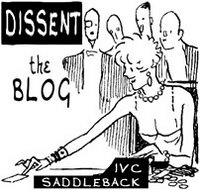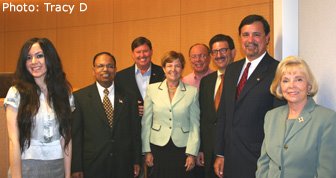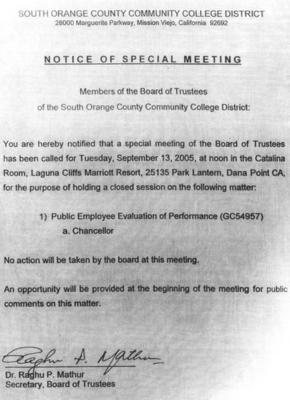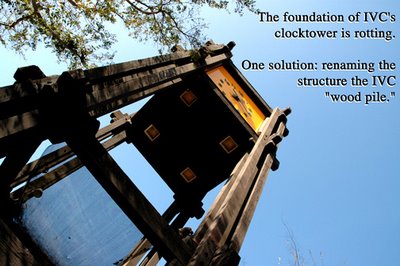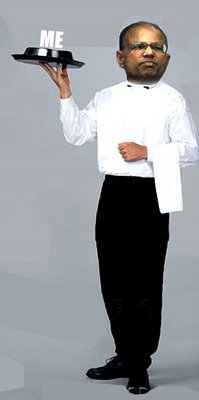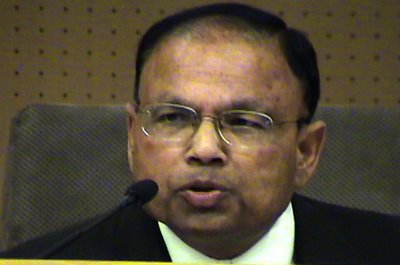Adopted: 7-24-06
BOARD POLICY 4011.6
SOUTH ORANGE COUNTY PERSONNEL COMMUNITY COLLEGE DISTRICT
EMPLOYMENT PROCEDURES FOR CHANCELLOR
SECTION I: GENERAL PROVISIONS
1. Preface: The hiring of a highly qualified Chancellor is essential to the mission of the South Orange County Community College District. Therefore, the governing board, with input through this process from administration, faculty and staff, has the responsibility to select a highly qualified Chancellor. The Office of Human Resources shall ensure that every aspect of the hiring process is implemented appropriately.
2. Scope: This policy applies to the recruitment and hiring process for Chancellor.
3. Equal Employment Opportunity Policy and Statement: The South Orange County Community College District shall recruit, hire, and promote in all job titles without regard to ethnic group identification, race, color, religion, sex, national origin, ancestry, physical or mental disability, age, medical condition, marital status, military service, sexual orientation, or any other basis protected by law. The District shall comply with the Board of Governors regulations relating to equal employment opportunity.
4. Definitions:
•
Board: The Board of Trustees of the South Orange County Community College District. • Board Designee: The Board of Trustees may elect to appoint an alternate designee to oversee the hiring process.
• Chair: Chair of the Hiring Committee.
• Chancellor: The Chancellor of the South Orange County Community College District. The policy also refers to Chancellor during the process, meaning the current, interim or acting Chancellor.
• Committee: The Hiring Committee, also known as the Search Committee.
• District: The South Orange County Community College District.
• EEO: Equal Employment Opportunity.
• HR Specialist: Human Resources Specialist, Hiring Compliance Officer and EEO representative assigned to the job opening.
• OHR: Office of Human Resources.
• SOCCCD: The South Orange County Community College District.
• Vice Chancellor: Vice Chancellor, Human Resources, or designee
5. Confidentiality and Conflict of Interest Statements: The South Orange County Community College District Confidentiality and Conflict of Interest Statements apply to this process.
6. Compliance: This policy is intended to comply fully and be interpreted in a manner consistent with all applicable state and federal laws and regulations, including but not limited to the Board of Governor’s equal employment opportunity regulations. Any provision of this policy that directly conflicts with any applicable state or federal law or regulation may be disregarded and a procedure that complies with the superseding authority shall be developed by the Chancellor and substituted until such time as the Board may adopt a formal amendment to this policy.
7. Oversight: Normally, the current, acting or interim Chancellor will provide oversight of the hiring process. However, the Board may appoint an alternate designee, as appropriate, to insure avoidance of any conflict of interest. The Chancellor or Board designee, with the assistance of the OHR, oversees the implementation of the hiring process and the activities of the hiring committees as they exercise their duties, specifically to ensure that actions of hiring committees are consistent with both the written stipulations and the intentions of this policy. It is the responsibility of the Chancellor or Board designee, to ensure the integrity of the hiring process established by this policy. If, in the judgment of the Chancellor or Board designee, the integrity of the process described herein has been substantially violated or abused, the Chancellor or Board designee, may order that the process be suspended, pending determination of an appropriate action in consultation with the Office of the Human Resources and the Board President.
8. Interpretation: Technical questions and minor problems will ordinarily be resolved by the HR Specialist in consultation with the OHR. In the event that a question of the procedural interpretation of this policy arises and cannot be resolved by the HR Specialist, the question shall be submitted in writing to the Vice Chancellor, or designee via the HR Specialist. If in the judgment of the HR Specialist, the Chair, the Chancellor or Board designee, a problem of interpretation occurs which threatens the viability or integrity of a Committee’s duties as described herein, all parties shall be immediately notified, and the hiring process shall be suspended pending resolution of the problem. The Chancellor or Board designee, in consultation with OHR, shall attempt to resolve any problem or difference of interpretation of this policy.
9. Exceptions: The Chancellor or Board designee, in consultation with the OHR, may reduce or extend the time period for any step established in this policy. Such exceptions shall be as narrow as possible to address, in a reasonable manner, the unusual circumstances posed. In the event of such an alteration to the process as described herein, the Chancellor or Board designee will notify the OHR in writing, stating the unusual circumstances necessitating the extension or exception.
SECTION II: RECRUITMENT
1. When the need for hiring a new Chancellor is determined and recommended by the Board of Trustees, and upon the Board’s approval, a Request to Announce Form is completed and submitted to the Office of Human Resources.
2. The Board of Trustees may consider employment of a professional consultant to assist with the Chancellor search process.
3. Job Announcement Content: The job announcement will determine the screening criteria for review of applicant files. Care must be taken to ensure accurate and job-related criteria. It shall contain:
a. Opening and closing dates
b. Summary of duties and responsibilities
c. Minimum qualifications
d. Desirable qualifications
e. Application requirements and procedures
f. Special testing, if applicable
g. Submission of materials, if required
h. EEO Statement
4. All openings will be advertised through the Office of Human Resources.
5. As a position is opened, it will be announced by the Office of Human Resources with sufficient lead-time to advertise the position. This should normally be a minimum of ten weeks or 50 working days, unless otherwise requested by the Chancellor.
6. Applications, resumes, and other required materials are accepted only by the Office of Human Resources.
7. Announcement brochures will be distributed to appropriate professional sources.
SECTION III: APPLICATION PROCESS
1. Submission: Applications, resumes, and other required materials are accepted only by the OHR via the District’s online employment site.
2. Application Period: Applications may be submitted for a set period of time or “until filled.” In the case where a position is “open until filled,” screening may not begin until at least 30 working days after advertising has appeared in some public forum.
In the case where a position is “open until filled,” applications submitted less than two working days prior to the beginning of the screening process may be excluded from consideration.
3. Search Extension: The recruitment period will be extended when the applicant pool has fewer than five minimally qualified applications, unless the OHR, the Chancellor or Board designee and Board President agree to forward the pool.
SECTION IV: SEARCH COMMITTEE
The Chancellor or Board designee will appoint the Search Committee according to the following criteria: The Search Committee shall consist of no more than eleven and no less than seven voting members. A majority of the appointees to the Search Committee will be administrators and managers.
a. The Chancellor or Board designee will select six administrators and managers. The Chancellor or Board designee also will appoint the Search Committee Chair
b. Each Academic Senate will select one faculty member
c. The South Orange County Community College District Faculty Association will select one faculty member
d. The California School Employees Association Chapter 586 (“CSEA”) will select one classified employee
e. The Police Officers Association (“POA”) will select one of its members
1. Terminate Process: The Chancellor or Board designee may terminate the process if, in his or her judgment, the formation of the Committee has violated the integrity of the hiring process.
2. EEO Representative: The EEO Representative shall be appointed by the Vice Chancellor or designee, and may be replaced as necessary by another qualified staff member. Only a trained staff member may serve as an EEO representative.
3. Orientation: The HR Specialist will conduct an orientation meeting to explain roles, duties, expectations, timelines, and the rating process to the Committee members. At this time, the Committee will agree on the schedule. All members must also sign a Confidentiality and Conflict of Interest Statement. All HR forms must be completed in ink.
4. Relative Weights: At the Orientation, the Committee will assign the value to be given to the application and to the interview components. Neither the screening nor the interview may be weighted less than 30 percent each.
5. Duration: At the Orientation, the Committee will determine the length of the interview.
6. Criteria: The Committee shall establish in writing the criteria to be used in screening the applications and selecting the applicants to be interviewed. The screening criteria shall be job related, and based on the position description and the District hiring policy.
7. Interview Questions: All questions and other requirements must be kept confidential throughout the process. The Committee will develop and forward to OHR for approval a list of interview questions to be asked of each candidate, as well as any exercise, presentation, or other requirement. The list of questions and requirements will be provided to OHR at least five business days prior to the first scheduled interview. All questions and other requirements shall be job-related and composed with the intent of evaluating the candidate’s knowledge and abilities in relation to the minimum and desirable qualifications as published in the formal job announcement. OHR may provide sample questions at the request of the Chair for the consideration of the Committee. The list of questions and other requirements as described above must be approved by a majority vote of the Committee. The Vice Chancellor or designee reviews all Committee approved questions and other requirements if applicable to ensure compliance with District policies and State and Federal laws and regulations, and must approve all interview questions and other requirements prior to the interview. The Vice Chancellor or designee may make editorial changes; however, if a particular question is deemed by the Vice Chancellor or designee to be in need of substantive changes, these changes will be made in consultation with the Chair or designated discipline expert. The Chair or designee will be provided with the OHR-approved list of questions and other requirements if applicable one (1) business day before the interview.
8. Participation: Committee members are expected to be available as necessary for Committee functions, to fully participate in all required meetings and related Committee responsibilities, and to complete screening functions in a timely manner. Any member who fails to complete screening in a timely manner, or who misses Committee meetings, may be subject to removal by the Chancellor or Board designee after consultation with the Chair and the OHR. The scores or ratings of a Committee member who withdraws prematurely or is removed will not be counted in the uncompleted phase or section of the process.
9. Minimum Membership: In the event that the Committee membership falls below the required minimum number of members, the Chancellor or Board designee, after discussion with the OHR, shall determine whether to restart the hiring process, appoint a replacement Committee member, or continue the hiring process with fewer than the minimum number of committee members.
SECTION V: SCREENING PROCESS
1. Determination of Application Completeness: The OHR will screen all applicants for minimum qualifications as specified in the official announcement for that position before submission to the Committee, thereby determining applicants who will be paper screened and eligible for interviewing. The Search Committee Chair has the option to be involved in the minimum qualification screening process.
2. Review of Application: The review of application and resumes is done online on the District’s employment site on an individual basis by each committee member.
3. Evaluation of Application Materials (Screening): The Committee may not begin to review applications until the appropriate application period has elapsed. At the Orientation meeting, the Committee in consultation with the HR Specialist shall specify the time(s) and location(s) when application materials shall be available. During the screening process, Committee members may not remove the files or their contents, copy or alter any material contained in the files, or append comments or marks. Notes on the candidates must be kept in the Committee member’s evaluation file, which will be maintained by the OHR.
4. Scoring: Each application shall receive an independent evaluation according to job-related criteria by each member of the Committee. The Committee members shall rate each applicant on the appropriate forms provided by the OHR.
5. Recommendation of Candidates for Interview: Using a final ranked list, without names, of candidates by score, the HR Specialist and the Chair will meet to determine the lowest score to qualify for an interview. On the basis of the lowest qualifying score, the OHR shall assemble a list of candidates to be interviewed.
6. Interview Scheduling: The OHR shall schedule selected candidates for a first-level interview, according to the schedule adopted by the Committee, giving them at least five business days notice of the interview. Exceptions to the five-day notice may be granted by the Vice Chancellor or designee.
7. Travel Reimbursement: Reimbursement claims for over 300 miles must be submitted no later than 30 days after the interview. Any reimbursement claim is limited to standard District reimbursement guidelines and shall not exceed $1500.
SECTION VI: INTERVIEW PROCESS
1. Materials: At the beginning of each interview meeting, the applicant’s files shall be made available to the Committee, along with the appropriate OHR forms. Each member of the Committee will receive a schedule of interviews, and the interview questions.
2. Site: The Chair will inform the HR Specialist of any special interview needs. After consultation with the Chair, the HR Specialist will make the arrangements for the interview location.
3. Set Time: Each applicant shall be afforded the opportunity to have an interview of approximately equal length.
4. Search Committee Names: Each candidate will be provided with a list of the names and titles of the Search Committee just prior to the interview.
5. Review of Interview Questions: Candidates will have the opportunity to review the interview questions 15 minutes in advance of their interview. All questions must be job-related. Answers to core questions should reveal attitudes towards the job, appropriateness of education and experience, competency in the field, extent of responsibility and philosophical orientation with respect to the functions involved.
6. Writing Sample: The candidate will be asked to provide a writing sample in response to a question provided to the candidate by the Search Committee before the interview.
7. Questions: Each candidate will be asked the same interview questions in the same order. During the interview, follow-up questions may be asked to clarify or further investigate a response given by a candidate. If, in the judgment of the HR Specialist, a follow-up question violates standards of non-discrimination, the HR Specialist will direct the candidate to disregard the question. Follow-up questions should be kept to a minimum to maintain consistent standards of candidate evaluation throughout the interview process. Any question by the candidate pertaining to conditions of employment, such as salary, benefits, or policy, must be referred to the OHR.
8. Group Discussion: Committee members shall be given an opportunity to discuss each applicant and only that applicant after each interview. Comprehensive discussion shall not take place until after all interviews are completed. No discussion of any candidate may take place unless the HR Specialist and all committee members are present. Committee members are encouraged to discuss candidates’ fulfillment of job-related criteria in a candid and thorough manner, but shall not discuss specific numeric scores to be given to any candidate. The HR Specialist shall be responsible for ensuring that discussion is limited to job-related criteria.
9. Score: Each Committee member is responsible for exercising his or her independent judgment in rating each candidate. Following the Committee’s discussion of the candidates, each committee member shall rate independently each candidate using the appropriate form provided by the OHR. At the conclusion of the interviews and any subsequent discussion, each member of the Committee shall enter a final interview score for each candidate, and then calculate the final total score from the appropriately weighted screening and interview scores. The OHR will verify and compile final scores for all candidates.
10. Selection of Finalists: After the conclusion of interviews, the Chair and the HR Specialist shall assemble a ranked list of candidates and their final scores. Using this list, the Committee will determine the lowest score to qualify as a preliminary finalist for a second level interview. The committee shall provide job related reason why a candidate interviewed is not forwarded to the second level for final interviews. The committee shall forward at least three (3) finalists for second level interview.
SECTION VII: REFERENCE CHECKS
1. Timing: Official reference checks, in accordance with the OHR Guidelines, will be performed prior to the submission of the recommended candidates to the Chancellor for second-level interviews.
2. Required Professional References: Each applicant will be asked to provide at least three references, preferably from the following categories:
• Previous supervisor (from the past five years);
• Colleague/co-worker who can address professional competency and appropriate practical skills;
• Other professional references
If the individual provided as a reference is unavailable, or if the candidate fails to provide sufficient references, the OHR, in consultation with the Chair, may request additional references from the candidate.
3. Reference Contacts: The Vice Chancellor, in conjunction with the Chair, will conduct the reference checks and record the information on the appropriate OHR form. The HR Specialist will verify all data on the application. Each reference for each finalist shall be asked the same questions about that finalist, and shall be asked whether he or she can recommend the finalist in question without reservation, and, if not, to specify these reservations. The reference checker(s) shall ask no question that is impermissible under applicable laws prohibiting discrimination in employment, or that seeks information unrelated to the qualifications for the position. The reference checker(s) shall not provide any derogatory or confidential information about the finalist, and shall not provide with any assessment of the quality of the finalist’s qualifications.
SECTION VIII: SECOND-LEVEL INTERVIEW
1. Finalists: The Board of Trustees shall be provided an unranked list of finalists by the Chair, and a report of the final scores for all candidates including job related reason(s) for not forwarding candidates interviewed.
2. Second-level Interview: The Board of Trustees will interview the finalists for the position. The Board may invite the Chancellor or Board designee to participate in the interview process.
3. Second-level Interview Schedule: Finalists shall be given at least five (5) business days notice of the interview.
4. Content: The Board may ask any job-related questions, may ask follow-up questions, and may provide clarification of ambiguous or unclear questions. The Vice Chancellor or designee must review any questions, exercises or other requirements prior to the interview to ensure compliance with district policies and State and Federal laws and regulations.
5. Substantially Similar Interviews: Although variations are permitted throughout the interview process, the Board shall give each candidate a substantially similar interview of approximately the same duration, involving the same segments and exercises.
6. Additional Interviews: After completing this initial round of second level interviews, the Board of Trustees has the authority to interview additional candidates from the first level interview pool in the order of the next highest Search Committee rankings.
7. Consultation: The Board may consult with the Chair of the committee after the second-level interviews and before any offer of employment is made.
8. Termination of Search: After the completion of all second level interviews, the Board of Trustees may decide to stop the process, at which point the position would be reopened.
9. Board Reference Checks: Following candidate interviews, the Board of Trustees may make further job-related reference checks. The Board may conduct site visits.
10. Recommendation for Appointment: Upon selection of the finalist by the Board of Trustees, the Chancellor or Board designee will submit the recommendation to the Office of Human Resources for the offer of employment and presentation to the Board for final approval.
11. Travel Reimbursement: Reimbursement claims for over 300 miles must be submitted no later than 30 days after the interview. Any reimbursement claim is limited to standard District reimbursement guidelines and shall not exceed $1500.
 From this morning's Irvine World News (SOCCCD, p. 8):
From this morning's Irvine World News (SOCCCD, p. 8):president and clerk.

 Saddleback and Irvine Valley Colleges must focus on student needs and fiscal accountability. I promise to work for those goals. Thirty years [sic] experience in higher education and private business has prepared me for the position of Trustee.
Saddleback and Irvine Valley Colleges must focus on student needs and fiscal accountability. I promise to work for those goals. Thirty years [sic] experience in higher education and private business has prepared me for the position of Trustee.

